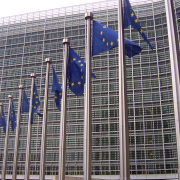Title of document
Draft Commission Implementing Regulation concerning the non-renewal of the approval of the active substance chlorpyrifos-methyl, in accordance with Regulation (EC) No 1107/2009 of the European Parliament and of the Council concerning the placing of plant protection products on the market, and amending the Annex to Commission Implementing Regulation (EU) No 540/2011 (5 page(s), in English)
Description
This draft Commission Implementing Regulation provides that the approval of the active substance chlorpyrifos-methyl is not renewed in accordance with Regulation (EC) No 1107/2009. Existing authorisations of plant protection products containing chlorpyrifos-methyl will be withdrawn and such products can then no longer be placed on the market. The non-renewal of the approval is based on a scientific assessment conducted under Regulation (EC) No 1107/2009 by experts from the Member States of the European Union and the European Food Safety Authority (EFSA). This decision only concerns the placing on the market of chlorpyrifos-methyl and plant protection products containing it. Following non-renewal of approval and the expiry of all grace periods for stocks of products containing this substance, separate action will be taken to swiftly lower all existing MRLs to the limit of quantification and a separate notification will be made in accordance with SPS procedures. As soon as the lowered MRLs will be applicable (expected in the third quarter of 2020), foodstuffs with higher levels of chlorpyrifos-methyl will become non-compliant and can no longer be placed on the EU market.
Notifying member: European Union
Notification: G/TBT/N/EU/683
Objective tag
Protection of human health or safety; Protection of animal or plant life or health; Protection of the environment
Objective
In order for an active substance to be approved in accordance with Regulation (EC) No 1107/2009 (concerning the placing of plant protection products on the market), it must be demonstrated that the substance is not harmful to human health, animal health or the environment. Criteria are listed in Article 4 of the Regulation (and further detailed in Annex II) which must be met to enable approval. During the evaluation and peer-review of chlorpyrifos-methyl, a number of concerns were identified. These are detailed in a statement of the European Food Safety Authority (EFSA): A genotoxic potential of chlorpyrifos-methyl, which cannot be ruled out based on the information available, taking into account the concerns raised for chlorpyrifos (During the peer review, experts considered read across between the two substances justified as they are structurally similar and have similar toxicokinetic behaviour). Consequently, health based reference values cannot be established for chlorpyrifos-methyl and the dietary and non-dietary risk assessments cannot be conducted. Developmental neurotoxicity (DNT) – the available DNT study on chlorpyrifos-methyl did not allow for a full assessment of effects on brain development, in particular since effects on cerebellum height could not be evaluated due to the lack of controls in females and a no observed adverse effects level ‘NOAEL’ for DNT could not be established. Since DNT effects were observed in the available developmental neurotoxicity on chlorpyrifos (adverse effects were seen at the lowest dose tested in rats and a NOAEL could not be established) concerns exist also for chlorpyrifos-methyl. Moreover, epidemiological evidence exists showing an association between exposure to chlorpyrifos-methyl during development and adverse neurodevelopmental outcomes in in children. During the peer review, experts suggested that classification of chlorpyrifos-methyl as toxic for the reproduction category 1B, H360D ‘May damage the unborn child’, in accordance with the criteria set out in Commission Regulation (EC) No 1272/2008 [1] would be appropriate. These concerns mean that chlorpyrifos-methyl does not meet the approval criteria as outlined in Article 4 of Regulation (EC) No 1107/2009 and cannot be approved currently. Existing authorisations will need to be withdrawn; Member States must withdraw existing authorisations for plant protection products containing chlorpyrifos-methyl at the latest by 1 month from the date of entry into force. A period of grace in line with Article 46 of Regulation 1107/2009 is allowed for and shall expire at the latest 3 months from the entry into force. [1] Regulation (EC) No 1272/2008 of the European Parliament and of the Council of 16 December 2008 on classification, labelling and packaging of substances and mixtures, amending and repealing Directives 67/548/EEC and 1999/45/EC, and amending Regulation (EC) No 1907/2006 (OJ L 353, 31.12.2008, p. 1).
Source: Chemycal



